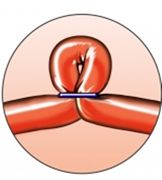Endoscopic Band Ligation

Esophageal varices are abnormal blood vessels (veins) that develop in the esophagus.
They have abnormally thin walls, and the blood pressure within them is very high. This combination makes esophageal varices very dangerous, because they can burst and cause life-threatening bleeding.
Endoscopic band ligation is the use of elastic bands to treat the varices. It is done as part of an upper gastrointestinal (GI) endoscopy.
Reasons for Procedure
This procedure is done to prevent or treat bleeding from esophageal varices (enlarged veins). If left untreated, varices could rupture and bleed severely.
Possible Complications
Problems from the procedure are rare, but all procedures have some risk. Your doctor will review potential problems, like:
• Painful swallowing
• Bleeding
• Esophageal damage
• Infection
Some factors that may increase the risk of complications include:
• Alcoholism
• Bleeding disorder
• Active bleeding
• Advanced age
• Heart or lung problems
• Use of certain medicines
• Smoking
What to Expect
Prior to Procedure
• Your doctor will likely do a physical exam and order blood tests.
• Do not eat for 8 to 12 hours before the procedure.
• If you have diabetes , discuss your medications with your doctor.
• Arrange for transportation after the procedure. You should not drive for 24 hours after the procedure.
• Talk to your doctor about your medications. You may be asked to stop taking some medications up to one week before the procedure.
Anesthesia
• Local—You may be given an anesthetic solution to gargle, or your throat may be sprayed with a numbing anesthetic.
• You may also be given a sedative to help you relax.
• Conscious sedation—You may be given medications through an IV. It will help you relax. Other medications will be given to treat any pain you feel during the procedure.
• General anesthesia—If you are having the procedure due to uncontrolled bleeding you may need to have intubation and general anesthesia to inhaling blood.
Description of the Procedure
For this procedure, you will lie on your left side. If you are not intubated a mouthpiece will be placed to help keep your mouth open. An assistant will be in the room to monitor your breathing and heart beat. You may also be given oxygen through your nose. A suction tube will be used to clear the saliva and other fluids from your mouth.
A lubricated endoscope will be placed into your mouth. It will be passed down your throat and into your esophagus. The scope will have a small light and a camera. The doctor will watch the images on a video monitor. Air will be passed through the scope to help your doctor see your esophagus. The doctor will be able to locate the enlarged vein.
Instruments will be passed through the scope. The enlarged tissue will be sucked into the device’s chamber. One or more bands will be placed around the tissue to clamp off the blood supply.
How Long Will It Take?
Typically, less than one hour
Will It Hurt?
You will usually feel some pressure and discomfort, but not pain, during the procedure. After the procedure, your throat may feel irritated and sore.
Post-procedure Care
At the Care Center
You will be taken to a recovery area until the effects of your medications have worn off. In most cases, you will be observed for about an hour. If you feel well, you can then go home.
At Home
After returning home, you should do the following:
• Follow your doctor's instructions regarding your diet.
• Avoid driving or using heavy machinery for at least a day after your procedure. Sedatives may slow your reaction time.
• Avoid drinking alcohol for at least a day after your procedure.
• Get plenty of rest.
In the days or weeks after your procedure, the tissue that was banded will slough off.
Follow-up with you doctor as directed. You may need additional procedures.
Call Your Doctor
Call your doctor if any of the following occurs:
• Signs of infection, including fever and chills
• Bleeding from the mouth
• Increasing pain
• Nausea and vomiting
• Bloody vomit
• Difficulty swallowing
• Cough, shortness of breath, or chest pain
• Lightheadedness or weakness
• Bloody or dark black stools
• Severe abdominal pain
If you think you have an emergency, call for medical help right away.
![]() Please be aware that this information is provided to supplement the care provided by your physician. It is neither intended nor implied to be a substitute for professional medical advice. CALL YOUR HEALTHCARE PROVIDER IMMEDIATELY IF YOU THINK YOU MAY HAVE A MEDICAL EMERGENCY. Always seek the advice of your physician or other qualified health provider prior to starting any new treatment or with any questions you may have regarding a medical condition.
Please be aware that this information is provided to supplement the care provided by your physician. It is neither intended nor implied to be a substitute for professional medical advice. CALL YOUR HEALTHCARE PROVIDER IMMEDIATELY IF YOU THINK YOU MAY HAVE A MEDICAL EMERGENCY. Always seek the advice of your physician or other qualified health provider prior to starting any new treatment or with any questions you may have regarding a medical condition.

